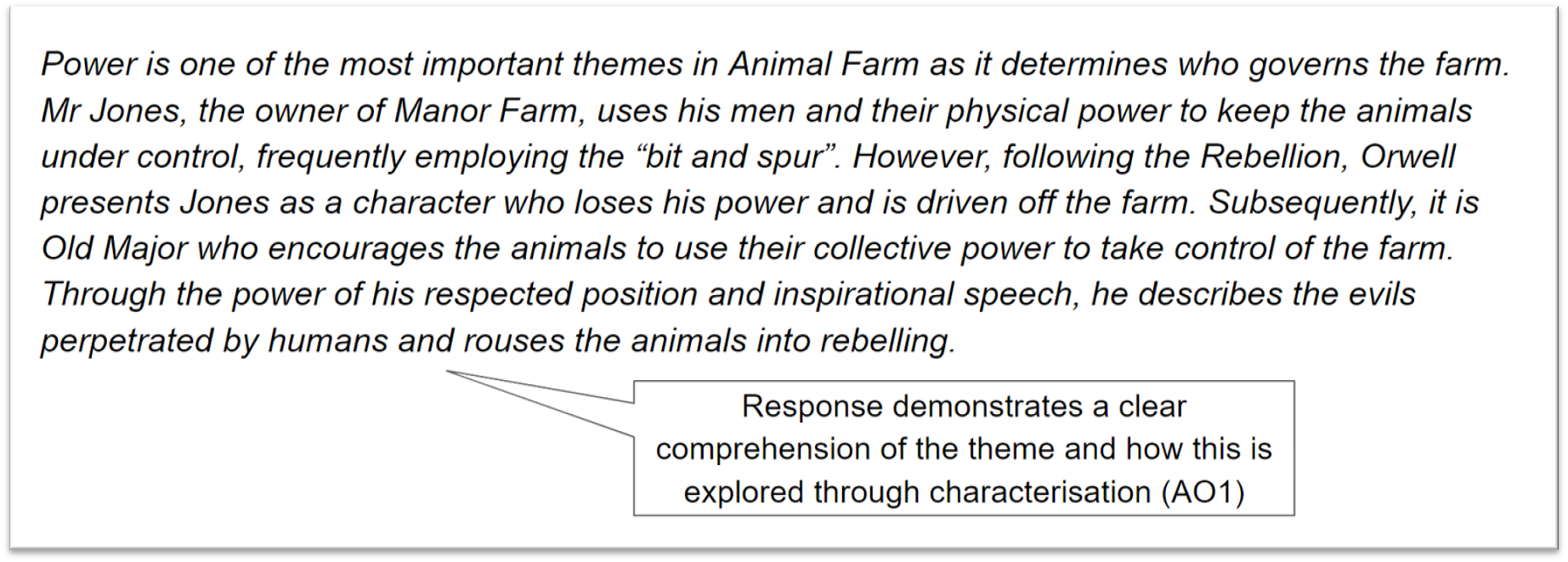|
In Animal Farm, power is one of the central themes of the novel and Orwell uses it to explore ideas such as manipulation, authority and corruption. Through the farm animals’ struggle for power, Orwell critiques authoritarianism and the importance of maintaining freedom and equality.
Power is one of the most important themes in Animal Farm as it determines who governs the farm. Mr Jones, the owner of Manor Farm, uses his men and their physical power to keep the animals under control, frequently employing the “bit and spur”. However, following the Rebellion, Orwell presents Jones as a character who loses his power and is driven off the farm. Subsequently, it is Old Major who encourages the animals to use their collective power to take control of the farm. Through the power of his respected position and inspirational speech, he describes the evils perpetrated by humans and rouses the animals into rebelling.
Orwell uses the character of Old Major to explore ideas about power, control and inequality. He attempts to present the animals with values in order to inspire them, for example: “All animals are equal.” He is also used to warn the animals from becoming like humans or adopting their vices, for example when he warns “that in fighting against Man, we must not come to resemble him". The consequences of Old Major’s speech are far-reaching. In some ways, his speech could be viewed positively as it leads to the eviction of Jones and enables Animalism to become a reality for a short period of time. However, it also becomes the catalyst for Napoleon’s rise to power and the subsequent brutality on the farm which follows. Despite Old Major’s best intentions, his admirable and principled ideas are subject to corruption by others for their own benefit. For Orwell, it is not necessarily merely the doctrine which is at fault, but the individuals who occupy positions of power and authority within it.
Power is also significant in the novel as evidenced through the character of Napoleon. He increases his power by his own prestige and by separating himself from the other animals, thereby heightening his importance. Orwell portrays Napoleon as successful in attaining the support of the animals prior to Squealer’s use of propaganda and the use of his dogs. Through his powerful and highly persuasive speech, he unites the animals and causes the Revolution and declares that “Man is the only real enemy we have”. However, in order to maintain his power and authority, he uses violence and propaganda as methods of control. He resorts to using force (through his army of dogs) to silence any opposition and to protect himself. Furthermore, he controls information (mainly through Squealer) to discredit opponents such as Snowball and to falsify information.
As a character, Napoleon is a ruthless dictator, solely concerned with his own power. He will stop at nothing to gain absolute control and his amendments to the commandments illustrate his willingness to subvert the laws for his own gain. His final act of propaganda is to rewrite the seventh commandment to: “All animals are equal but some are more equal than others.” Orwell portrays him as a character who rules through fear and his slogan “Vote for Napoleon and the full manger” is used to instil fear into the animals, as they may starve without his leadership. In the novel, Orwell uses the animals to represent the peasant workers of Russia who were exploited by Tsar Nicholas II. They never earned enough money to pay for food or accommodation and the Revolution of 1917, and the changes it brought, only led to more hardship and starvation under the power and rule of Lenin and Stalin. Similarly, as a dictator, Napoleon’s brutality and determination are clearly evident and he utilises propaganda to persuade the animals that he is powerful and without fault.
Similarly, Squealer’s use of rhetoric and propaganda is also used to establish and maintain power over the other animals. He gradually twists and distorts information to justify the pigs’ behaviour in order to keep most of the other animals ignorant. While Orwell condemns the leaders on the farm, he also condemns the other animals who are complicit in this corruption through their inaction, fear, and ignorance. Squealer is able to convince the animals that Napoleon is working in their best interests and in many ways, it could be viewed that Squealer is fundamental to Napoleon remaining in power as he can manipulate language extremely well.
Throughout Animal Farm, Orwell uses the theme of power to explore authoritarianism and ideas such as manipulation, authority and corruption. Orwell’s novel ends with the pigs becoming indistinguishable from the humans they originally rebelled against. Orwell uses this to symbolise the cyclical nature of power and the tendency for all power to descend into tyranny.
|








